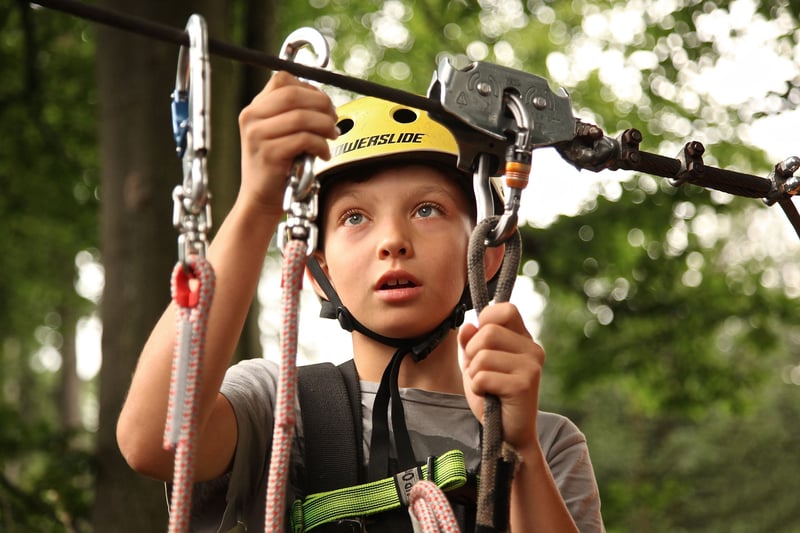
Over-scheduled kids, exhausted parents, no family time? Feel like you're constantly trying to be in three places at once, chauffeuring children to clubs, training and rehearsals?
How much time should kids spend on extra-curricular activities? And how can families stay on top of it all?
There are so many benefits to pursuing hobbies and interests outside of the classroom - discipline, skill building, health and fitness, perseverance, friendships and social skills, to name a few. While our children are busy at their dance/karate/soccer clubs, they are staying off their screens ... and we can stay longer at work. With so many great (and often free) outside-school-hours opportunities at King's, why wouldn't we want our children to take advantage of them?
Research shows that active kids do better in life and that participation in a sport or hobby is good for a child's emotional well-being.
So what's the problem?

Research shows that active kids do better in life
According to the elaborately named UK study, ‘The helping, the fixtures, the kits, the gear, the gum shields, the food, the snacks, the waiting, the rain, the car rides … ’: social class, parenting and children's organised activities,
- 88% of the children in the study took part in extra-curricular activities four to five days a week
- Nearly 60% of the above were doing more than one activity an evening
While this research focused on British children, it's fair to say the situation is not that different in Australia. Kids aren't just going to Scouts on a Tuesday night or playing soccer on a Saturday morning. They are enrolled in multiple activities each week. In families with more than one child (i.e. the majority), siblings often get taken along to wait for their brother/sister. As a consequence, children can find themselves outside the home after school every night, even if they're not taking part.
Participation in too many extra-curricular activities can take its toll on time, family life and even a child's mental health. The busyness of constant training, travelling, practice, rehearsals and highly organised childhoods can result in exhausted parents, stressed kids and families who never spend time together.
Warning signs that your child is doing too much
- They're exhausted. There are dark circles under their eyes. They keep dozing off at the wrong times. They can't get out of bed in the morning.
- Fitting in homework is a struggle.
- Their schoolwork is going downhill.
- They only have one free night a week.
- They resist practice (kids usually enjoy practising things they love).
- They are reluctant to attend an activity or continually find reasons not to go.
- They seem positively joyful when an activity is cancelled.
- They are stressed and overwhelmed.
- You feel stressed and overwhelmed, facilitating everyone's activities.
- You feel like you're always in the car taxiing children around.
- There is not enough spare time for family/friends/downtime.
- You are no longer eating as a family - meals are eaten in 'shifts', everyone eating at different times between their various engagements.
What children really need
- Exercise
- Sleep (early training before school and activities that end late at night can take their toll)
- Play
- Time with friends
- Family time
- Homework/study
- Relaxation and downtime - listening to music, watching TV
- Boredom - daydreaming, nothingness, staring at the ceiling
Extra-curricular pursuits provide some of the above. However, unstructured play, exploration and simply 'hanging out' with friends is equally important. Time to unwind and do nothing is just as crucial to a young person's development as physical and mental activity. An over-scheduled lifestyle makes this impossible.

Time to hang out with friends is important
Managing the juggle
So, how much is too much? How do you manage those busy schedules, keep on top of schoolwork and maintain a healthy family life? When do you say enough's enough and start pruning?
Depends on the child. Depends on the family. Depends on the season.
A caveat: It is impossible to be prescriptive about how much extra-curricular activity is too much. There are too many many variables, including:
- age and temperament of the child;
- availability of parents (or grandparents) to ferry children around;
- number of children in family;
- work and school commitments;
- time and duration of activities;
- cost;
- impact on family life.
There will also be periods where your children may be required to dedicate more time than usual to an activity, e.g. final rehearsals for a school play, the run-up to a music exam or participation in a specific carnival or event.
However, here are some useful tips and to help you manage the juggle and restore a little sanity to family life:
1. Reassess and evaluate
- Do an activity audit - what is necessary and what is not?
- Look at the signs - are your children exhausted, resisting practice or simply lacking joy? Which activities energise and motivate them?
- If you were to cancel all your children's out-of-school activities, which one would they beg you to keep?
- Ask your children why they want to do their activities: Because they feel obliged? Because their friends do it? Because they want to excel? Friendships and priorities change. The impetus for pursuing an interest may no longer be relevant.
- Look at your family life - how is the extra-curricular load impacting it and what could be dropped to improve it? What would you all do together if you had an extra night free each week?
2. Be choosy and streamline
- Prioritise the quality of an activity, rather than the time spent on it. This might mean enrolling your child in a fun Saturday morning club instead of a competitive league requiring three nights' training a week. Or one-on-one tuition for an hour instead of group tuition for two hours.
- Make use of free activities run by schools, churches and community groups to ease the financial burden. King's offers many no or low-cost activities to its students before and after school, including choir, athletics training, drama (school musical/theatrical productions) and group tutoring.
- Use free or 'trial' lessons before making any commitments. Suggest your child tries an activity for a term before making plans for the rest of the year.
- Consider variety - early specialism or focus on a single activity can be damaging (and boring!).
- Differentiate: Try activities that are not pursued at school.
- Encourage sports diversity to reduce the chance of overuse injuries (even professional athletes practise other sports).
- Be seasonal: Could your children do different activities in the winter and summer months - e.g. trampolining lessons in winter and soccer in summer - rather than cramming everything in to the same season?
- Differentiate: Try activities that are not pursued at school.
3. Stay organised and schedule
Schedules are key. However, working out the logistics of when children need to be at different locations, how they are going to be transported and where meals and homework fit in shouldn't require military precision! If something looks too complicated or impossible, it probably is.
- Put up a family planner in the house for everyone to see so that no-one gets caught out.
- Use electronic diaries/scheduling apps, where appropriate. (We use GameDay to keep on top of my son's basketball match schedules). Make use of automatic reminders and notifications.
- Schedule in breaks and downtime (important!).
- Have bags and sports kits packed and ready to go.
- Prepare grab-packs of healthy snacks for kids to take with them.
4. Prioritise schoolwork and assignments
Talk to your child's teachers for advice and guidance if things are getting out of hand.
5. Use 'hidden' time
For example:
- Use lunch breaks for library study at school.
- Practice musical instrument before breakfast.
- Listen to your child read while cooking dinner.
- Practise times tables aloud in the car.
6. Share lifts / car pool with other parents
Older children may be able to use public transport, walk or cycle to activities.
7. Give your child more responsibility for their chosen activities
If your child is eager to pursue their interests and needs your support to make them possible, they should be expected to help with the logistics.
Depending on their age, this might include:
- ensuring they are prepared and ready to go on time;
- packing and cleaning their own sports kit;
- preparing their own snacks;
- taking responsibility for practice, rather than waiting to be nagged or reminded;
- making sure their homework and chores are done in time;
- helping around the house to free up your time.
You'll soon discover how important their hobbies are to them (or not).
8. Take a break
... for a week, a month ... or a season. Enjoy a fallow period. Use the space to rest and re-evaluate what is really important to your children and your family. School holidays are ideal for this so resist the temptation to over-schedule the school breaks with coding camps, dance workshops, sports intensives etc.
How do you manage the juggle of school, activities and family life? What advice would you give?










